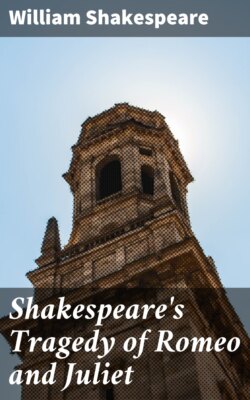Читать книгу Shakespeare's Tragedy of Romeo and Juliet - William Shakespeare - Страница 6
На сайте Литреса книга снята с продажи.
The Sources of the Plot
ОглавлениеTable of Contents
Girolamo della Corte, in his Storia di Verona, 1594, relates the story of the play as a true event occurring in 1303; but the earlier annalists of the city are silent on the subject. A tale very similar, the scene of which is laid in Siena, appears in a collection of novels by Masuccio di Salerno, printed at Naples in 1476; but Luigi da Porto, in his La Giulietta,[1] published about 1530, is the first to call the lovers Romeo and Juliet, and to make them the children of the rival Veronese houses. The story was retold in French by Adrian Sevin, about 1542; and a poetical version of it was published at Venice in 1553. It is also found in Bandello's Novelle, 1554; and five years later Pierre Boisteau translated it, with some variations, into French in his Histoire de Deux Amans. The earliest English version of the romance appeared in 1562 in a poem by Arthur Brooke founded upon Boisteau's novel, and entitled Romeus and Juliet. A prose translation of Boisteau's novel was given in Paynter's Palace of Pleasure, in 1567. It was undoubtedly from these English sources, and chiefly from the poem by Brooke, that Shakespeare drew his material. It is to be noted, however, that Brooke speaks of having seen "the same argument lately set forth on stage"; and it is possible that this lost play may also have been known to Shakespeare, though we have no reason to suppose that he made any use of it. That he followed Brooke's poem rather than Paynter's prose version is evident from a careful comparison of the two with the play.
Grant White remarks: "The tragedy follows the poem with a faithfulness which might be called slavish, were it not that any variation from the course of the old story was entirely unnecessary for the sake of dramatic interest, and were there not shown in the progress of the action, in the modification of one character and in the disposal of another, all peculiar to the play, self-reliant dramatic intuition of the highest order. For the rest, there is not a personage or a situation, hardly a speech, essential to Brooke's poem, which has not its counterpart—its exalted and glorified counterpart—in the tragedy. … In brief, Romeo and Juliet owes to Shakespeare only its dramatic form and its poetic decoration. But what an exception is the latter! It is to say that the earth owes to the sun only its verdure and its flowers, the air only its perfume and its balm, the heavens only their azure and their glow. Yet this must not lead us to forget that the original tale is one of the most truthful and touching among the few that have entranced the ear and stirred the heart of the world for ages, or that in Shakespeare's transfiguration of it his fancy and his youthful fire had a much larger share than his philosophy or his imagination.
"The only variations from the story in the play are the three which have just been alluded to: the compression of the action, which in the story occupies four or five months, to within as many days, thus adding impetuosity to a passion which had only depth, and enhancing dramatic effect by quickening truth to vividness; the conversion of Mercutio from a mere courtier, 'bolde emong the bashfull maydes,' 'courteous of his speech and pleasant of devise,' into that splendid union of the knight and the fine gentleman, in portraying which Shakespeare, with prophetic eye piercing a century, shows us the fire of faded chivalry expiring in a flash of wit; and the bringing-in of Paris (forgotten in the story after his bridal disappointment) to die at Juliet's bier by the hand of Romeo, thus gathering together all the threads of this love entanglement to be cut at once by Fate."
